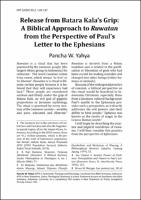Release from Batara Kala’s Grip: A Biblical Approach to Ruwatan from the Perspective of Paul’s Letter to the Ephesians
Abstract
Ruwatan is a ritual that has been practiced by the Javanese people (the largest ethnic group in Indonesia) for centuries. The word ruwatan comes from ruwat, which means ‘to free’ or ‘to liberate’. Ruwatan is ‘a ritual to liberate certain people because it is believed that they will experience bad luck.’ These people are considered unclean and firmly under the grip of Batara Kala, an evil god of gigantic proportions in Javanese mythology. The ritual is practised by every stratum of the Javanese society—wealthy and poor, educated and illiterate. Ruwatan is derived from a Hindu tradition and is related to the purification or liberation of gods who had been cursed for making mistakes and changed into other beings (either humans or animals). Because of the widespread practice of ruwatan, a biblical perspective on this ritual would be beneficial to Indonesian Christians, especially those from a Javanese cultural background. Paul’s epistle to the Ephesians provides such a perspective, as it directly addresses the evil powers and their ability to bind people. Ephesus was known as the centre of magic in the Graeco-Roman world.
URI
https://theology.worldea.org/evangelical-review-of-theology/http://repository.seabs.ac.id/handle/123456789/948

